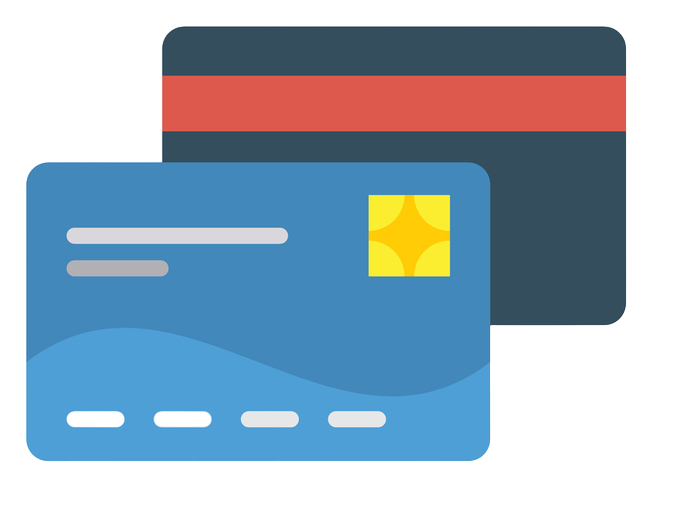There is an age-old debate about whether debit cards are better than credit cards. Some people love credit cards, and some hate them.
And of course, there are even those who believe you shouldn’t use either, and you should only spend cash. But cash isn’t practical for all spending needs. Sometimes you need to use a credit or debit card when cash is impossible or impractical. In those instances, you will most often need a debit card or credit card.
As more people are cutting back on their spending and paying more attention to managing their financial affairs, many have decided to cut out credit cards from their life and rely solely on cash or debit cards. It can be a good plan if you can’t trust yourself with credit cards. But there are differences between credit and debit cards that may affect you more than you think.
Which camp you fall under depends on many factors, and in many cases, there is no right or wrong, one-size-fits-all answer. What matters is which answer is right for you.
So let’s take an in-depth look at both credit cards and debit cards so you can make the best decision for your situation.
What’s the Difference Between Credit Cards and Debit Cards?
Making Purchases with Credit Cards
When making purchases on a credit card, you essentially use the money you borrowed from the financial institution that issued the card. The bank pays the debt, and you must pay the money back with interest each month unless you pay your bill in full.
Credit cards are generally accepted in all retail locations, restaurants, gas stations, e-commerce sites, and for bill payments. They can be used to reserve hotel rooms, rental cars, or airline tickets.
Making Purchases with Debit Cards
When you make a purchase using a debit card, you must already have the necessary cash in your bank account. Debit cards will subtract the money used for the purchase directly from your bank account.
Unlike credit cards, retail merchants and other businesses do not always accept debit cards. Those who accept them, such as car rental agencies, may also require significant deposits or proof of income before a debit card can be used for reservations. For example, it’s not uncommon for car rental agencies to place a large hold on your debit card if you use one to rent a car.
Security And Protection
Regulations and policies protect you if your credit or debit card is lost, stolen, or used by an unauthorized person. The level of protection differs between debit and credit cards.
Credit cards: If your credit card is lost or stolen and you notify your card company before charges have been posted to your account, you are not responsible for any unauthorized charges. If charges have already been posted, you will only be responsible for the first $50 of the charges.
Debit Cards: Debit cards offer this protection as well. However, you must notify your card issuer within two days of discovering unauthorized charges or losing your card. Notifying your cardholder within two days limits your liability to $50. If you don’t notice the transaction within two days and report the charge between 2 and 60 days, your liability increases to $500. After 60 days, your liability could be limitless. In the meantime, you are out of that cash, and even if you are credited the amount in the future, don’t expect the credit to appear promptly.
Zero-liability policies
Visa and MasterCard offer zero-liability policies for credit card holders, which means you are not responsible for any charges made when your credit card is not present. This covers online purchases or instances where credit card numbers are entered manually versus swiping the physical card at the merchant’s location. While zero-liability policies exist for debit card holders, it only applies to transactions that do not require using your PIN.
Want the ultimate protection? Use a virtual credit card number when shopping online. This helps prevent exposure to cyber thieves who hack stores’ databases to steal credit card numbers. A virtual credit card number is a one-time use number you get from your credit card company that allows you to make online purchases without exposing your real credit card number.

Compare the rates, fees, and rewards of top credit cards for military servicemembers and veterans, including cards with waived annual fees under the SCRA.
Debit Card Benefits
Debit cards have a few benefits – you can only spend what you have in your checking account. What you spend is automatically debited, and you won’t rack up any interest because you can’t carry a balance.
- Good Consumer Protections: Debit cards have much better consumer protections than they used to. In fact, they are now similar to credit card protections in many cases. However, your bank may place a hold on disputed charges while they investigate. This may tie up funds. Check with your bank for specific details.
- Access to Cash: Most stores allow you to get cash back when you make a purchase. I’ve been known to buy a $1 pack of gum to get $40 cash back with my purchase. I get a pack of gum, and I avoid the $3 ATM fee. It’s cheap and easy to get cash when your bank’s ATM isn’t convenient. You can’t get cash back with credit card purchases, and credit card cash advance fees are outrageous.
Credit Card Benefits
Credit cards have a variety of benefits, and in my opinion, they outweigh those of debit cards if, and I stress the word if, they are used properly.
- Excellent Consumer Protections. You are only responsible for the first $50 in unauthorized charges if your card is lost or stolen. And many credit card issuers have a $0 fraud liability. You can also dispute charges with your credit card issuer, which won’t tie up your funds while the dispute is active.
- Credit Card Rewards. Credit cards are also famous for offering generous rewards, including cash back, airline frequent flier miles, travel rewards, credit card points, gas rewards, hotel rewards, and much more.
- Other Credit Card Benefits Include: being able to establish and/or improve your credit score, extended warranties on some purchases (varies by the credit card issuer), and use as an emergency source of funds.
When Debit Cards are Good to Use
Here are times when you should consider using a debit card instead of a credit card:
- When there are no fees involved. Most major banks have eliminated debit card fees.
- When they have similar fraud and return protections as credit cards do.
- If your bank has a rewards program for its debit cards, though these are becoming very rare.
- You want to get cash back because your bank’s ATM is not convenient, and you do not wish to pay $3 to get $20 of your own money.
Other times debit cards are worthwhile: If you have no credit, bad credit, or are paying down your credit cards and don’t wish to add more debt, then debit cards are likely a good option. If you have no credit, I would consider establishing credit by getting a secured credit card and regularly paying the balance monthly.
When Credit Cards are Good to Use (and when to avoid them)
Here are times when you should consider using a credit card instead of a debit card (note: this assumes you pay your balance in full each month):
- If you are concerned about fraud, theft, or consumer data breaches (credit card protections don’t tie up the money in your checking account, leaving you free to continue spending).
- When you will pay the balance in full each month.
- If you want to earn rewards such as cash back, airline miles, hotel points, etc.
- When trying to build your credit score.
When you should absolutely not use a credit card: You shouldn’t use a credit card if you habitually carry a balance, fail to make on-time payments, or use or exceed all your available credit. All these will cost you a tremendous amount of money in the long run.
Are Credit Cards Better than Debit Cards?
There is no easy answer to this question because there are pros and cons to each method of money management. There are several factors to consider, and depending on your financial situation, you may find that one works better for you than the other, or you may use both equally as often.
Here are some considerations:
Creditworthiness
You typically need a good credit score because you must undergo an application process and a credit check. People with low credit scores may not qualify for a line of credit from a financial institution, though they may be able to apply for a secured credit card, which requires a deposit.
With debit cards, typically, any consumer with a bank account can link a debit card to their funds with being approved based on credit histories.
Consumer Protection for Credit and Debit Cards
Credit card companies have liability laws that obligate the consumer to be liable for $50 in the event of fraud. You have 60 days to report fraudulent charges or activity for the credit card company to investigate. Credit card companies also offer assistance with purchase issues and can act fast should your card be stolen.
Banks limit consumers’ liability to two days after debit card fraud occurs. Any information reported after that time increases the liability to $500. Chances are good that many consumers will not notice something amiss in just two days.
There is generally no additional warranty assistance on purchases made using a debit card.
Thieves can drain a bank account if they access your debit card.
The entire account is at risk until the loss can be reported and investigated if your debit card is stolen or lost. Bank accounts can be frozen until the investigation has been completed, so consumers may have limited access to their money.
The worst possible outcome is having your main checking account drained, leaving you without funds until the bank has the opportunity to conduct an investigation and reverse the charges.
Emergency Source of Funds
Credit cards are good in the event of an emergency. The line of credit allows purchases to be made within the credit limits. Using debit cards means you need to have the cash on hand to help when something happens.
Impulse Buys
If you are spending on credit, you may be inclined to spend more recklessly than if you had cash in hand. Credit card use can be tempting when you are not budgeting your cash properly, leading to overspending and an inability to pay the bill. With a debit card, you can not spend more than you have, which helps prevent impulse spending.
Rewards on Purchases
Both credit cards and debit cards can offer rewards on everyday spending. However, credit card rewards are much more generous than debit card rewards.
Debit card rewards: To begin with, very few debit cards offer rewards. Those that do may only offer a limited reward, such as ten cents cash back on each purchase. In general, debit card rewards won’t significantly affect your bottom line.
Credit card rewards: Credit cards, on the other hand, can offer extremely generous rewards, including cash back, rewards points, airline miles, hotel program points, and more. Many credit cards also offer generous sign-up bonuses, often reaching several hundred dollars in value.
Of course, credit cards aren’t for everyone, as they can entice some people to overspend and carry a balance.
Learning more about credit card rewards programs can have a significant financial impact.
But Which Do You Use, Debit or Credit?
On a personal note, I use credit cards almost exclusively. I will use my debit card for cash back or sometimes at local stores because I know debit cards cost the owners less in transaction fees. Otherwise, I almost exclusively use my credit cards.
There are two primary reasons: security and rewards.
Security:
Data breaches and theft aren’t going away. They have become more costly over the last few years. Millions of dollars have been stolen by thieves from those data breaches. I would hate to have my bank account drained overnight. It happened to a friend of mine when he was on vacation. It ruined his vacation, and he almost couldn’t get back home. Not fun.
I’ve also had my credit card number stolen on 2 occasions in the last 5 years – neither through any fault of my own (both were data breaches from large retailers). Due to the credit card protections, I wasn’t out any money from those thefts. But I hate to think what could have happened if my bank account had been tied to the thefts.
Rewards:
I also love credit card rewards. My family and I have used credit card rewards to pay for free airline tickets, get cash back, and earn other rewards totaling thousands of dollars. This was all earned in regular spending, and we don’t go out of our way to spend extra to earn a few more points.
Finally, I pay my balance in full each month. I also review my monthly statements to ensure the charges are legitimate and monitor my spending. Then I have my balance automatically pulled from my bank account each month by my credit card company, ensuring I won’t miss any payments and incur any interest or late fees. It’s easy to do with just about any credit card company. Log into your credit card account, link a bank account, and click submit. You can also do it over the phone.
For my purposes, credit cards are the most secure and rewarding form of payment. I don’t expect that to change any time soon.
Tips for Choosing Between Credit Cards and Debit Cards
Again, there are pros and cons to both. I recommend examining your financial habits and making the decision that best meets your needs. And if you decide to use either one, read the fine print.
You want to sign up for a credit card or debit card that doesn’t have any monthly or annual fees, and if you can, it is best to use a credit card or debit card with rewards programs so you can take advantage of cashback offers, rewards points or other benefits.
Here are some options:



About the comments on this site:
These responses are not provided or commissioned by the bank advertiser. Responses have not been reviewed, approved or otherwise endorsed by the bank advertiser. It is not the bank advertiser’s responsibility to ensure all posts and/or questions are answered.